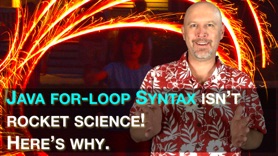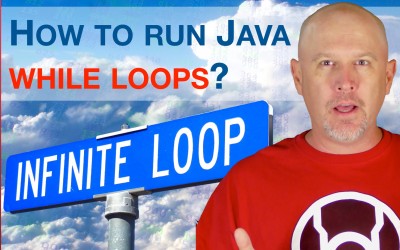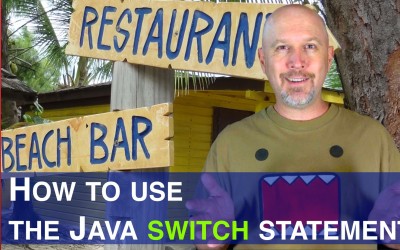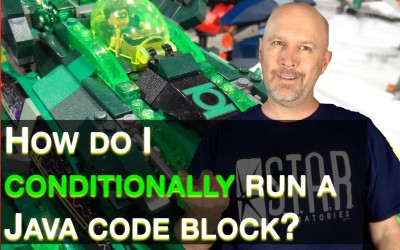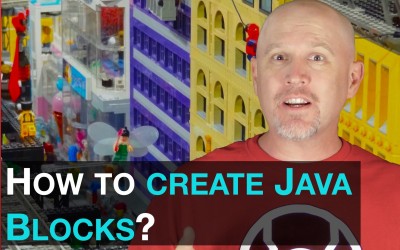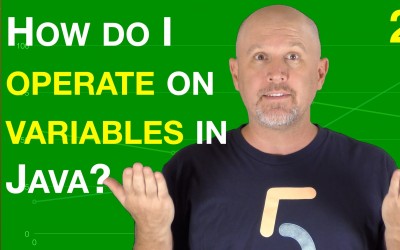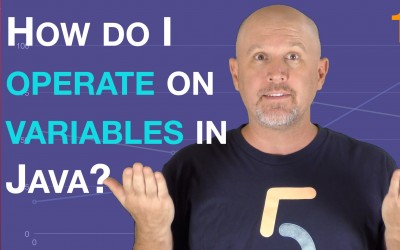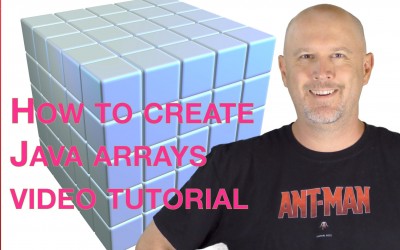Videos
Hours
Free Java course online for beginners
These videos collectively are the Java tutorial for beginners course on the Java 8 Programming language. It is designed for students new to Java and programming. This Java tutorial introduces you to the Core Java language.
Lessons start with the very basics, and introduce a new concept in each lesson. This allows you to skip over known topics, or dive into a specific topic. If you are new to Java and programming in general, you’ll want to start at the beginning. All lessons in the “Free Java Course Online” have a red stripe to the side of the video thumbnail for easy identification. Each lesson also includes the lesson number in the title. As always, if something doesn’t make sense, feel free to post questions in the comments on YouTube, or on the lesson page here on DeegeU.com.
New videos are added every week!
- Java Fundamentals
- Classes and Object Oriented Programming
- Annotations
- Exceptions
- Numbers and Strings
- Dates
- Generics
- Collections
- Enumerated Types
- Lambdas
- Concurrency
- File IO
- Regular Expressions
- And more!
Tutorial contents
The complete beginner’s guide to create a class in Java – J022
Java provides you with a wide variety of primitives for your applications. But look around you. You see people, cars, houses, books. You do not see too many numbers or characters walking around. We need some way to represent real world objects or concepts. In Java, you can create your own types to model any concept your program needs. These models are called classes. In this lesson I’m going to teach you how to create a class in Java.
Are you ready to tackle the fizzbuzz test in Java? – J021
Our goal for this lesson is to understand how to count to 100, variations on the question, and understand what is asked in implementing fizzbuzz Java test.
Java For-loop Syntax Is Not Rocket Science! Here’s Why! – J020
The for-loop is one of the most important Java control statements. You will be hard pressed to find an application that doesn’t contain a for-loop. The Java for-loop syntax isn’t rocket science. You’re telling Java I want you to loop over this block, and I want you to do it a set number of times. There’s two ways to loop using the for-loop, the basic way and the enhanced for-loop. In this video I’m going to show you both, and by the end you should be a pro with the Java for-loop syntax.
Fast guide to the Java while loop, break and continue – J019
In the fast guide to the Java while loop, break and continue statements, we’re going to look at control statements that cause our Java application to loop. Our goals are to understand the while and do-while statements and the difference between the two. We’ll touch upon infinite loops, and we will learn the difference between the keywords break and continue.
The Java switch tutorial – J018
In the Java switch tutorial we will learn what is a switch statement. We’re going to look at why we need to include breaks for each cases. We’ll look at the default case. And finally I’ll show you when it’s a good idea to use a switch, and when a simple if-else statement will suffice.
The Java If Else Tutorial Video – J017
The goals for the Java If-Else tutorial are to understand the if-then-else control statement. As we have in past lessons, we’ll look at ways the code go wrong. This way you know how to identify the errors in your code when they happen. We’ll touch upon short circuit evaluation, and then when we’re done looking at the normal if-thens, we’ll quickly look at the very succinct ternary version.
How to create Java blocks in your Java applications – J016
In this lesson we’re going to answer what is a Java statement. We will look at how to group these statements into a Java block. With Java blocks we will need to understand variable scope as we nest Java blocks. We’ll also see firsthand why we need to use braces to define blocks, even when it’s not 100% necessary.
The Java Operators Tutorial Video (part 2) – J015
The goal for the Java Operators Tutorial Video is to finish up our understanding of Java operators. We need to cover the equality operators, logical operators, and bit operators. Then we’ll take a final look at operator precedence.
Java operators tutorial video – J014
This Java operators tutorial video teaches you about the assignment, arithmetic, and unary operators for Java.
How to create Java arrays tutorial – J013
Imagine someone has asked you to create an application that reports that average high, median, and low temperature for your city. You could create three variables for each month. This would give you 36 variables to keep track of. Thats the three temperatures times twelve months. Determining the average low temperature for April would mean you’d need to have special code to match the selected month with the three variables for that month. That sounds like alot of work. Luckily there’s a better way that I want to show you. Java has a data structure called arrays.

DJ Spiess
Your personal instructor
My name is DJ Spiess and I’m a developer with a Masters degree in Computer Science working in Colorado, USA. I primarily work with Java server applications. I started programming as a kid in the 1980s, and I’ve programmed professionally since 1996. My main focus are REST APIs, large-scale data, and mobile development. The last six years I’ve worked on large National Science Foundation projects. You can read more about my development experience on my LinkedIn account.


